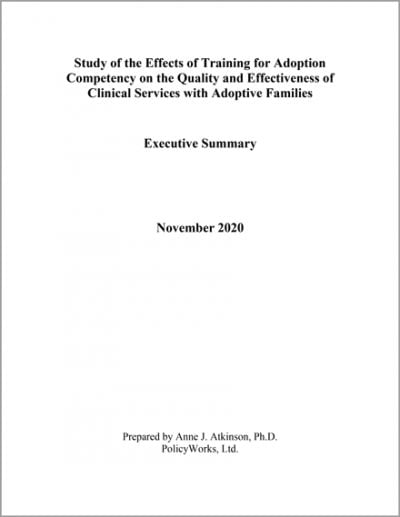A Training Gap
TAC-trained clinicians reported having significantly more hours of adoption-specific training than non-TAC clinicians. The exact difference? 101 hours, on average, versus just 13.8 hours.

This document introduces a study devoted to examining the effectiveness and quality of an adoption-specific training model called Training for Adoption Competency (TAC). The research assesses both the experiences and outcomes of adoptive families who were receiving clinical services in community-based outpatient settings.
The Center for Adoption Support and Education developed TAC — a 72-hour adoption-specific training for licensed clinicians — following widespread reports from adoptive families that mental health professionals did not “understand adoption.” Families also indicated that they were not benefiting from the provided treatment and, in some cases, they reported were being harmed.
The TAC model has four basic parts: 1) a 12-module curriculum; 2) clinical case consultation designed to reinforce the transfer of learning to practice, facilitated by advanced practitioners; 3) a robust trainer credentialing and support process that includes a week-long orientation, post-module debriefing, and rolling supportive technical assistance; and 4) an ongoing external evaluation that examines training delivery, effectiveness, and outcomes to help inform training program management and curriculum refinement.
The study findings indicate that TAC enhances clinical practice as it relates to adoptive families, adopted youth and birth parents. Accordingly, the publication’s authors call for the model to be expanded.
Evidence informs both the design and content of the TAC curriculum. This evidence indicates that: 1) adopted children and their families represent a distinct population with elevated risk for a range of difficulties; 2) standard clinical practices are often inappropriate or even damaging to some adoptive families; and 3) clinicians need specialized knowledge and skills to appropriately assess and intervene with adoptive families.